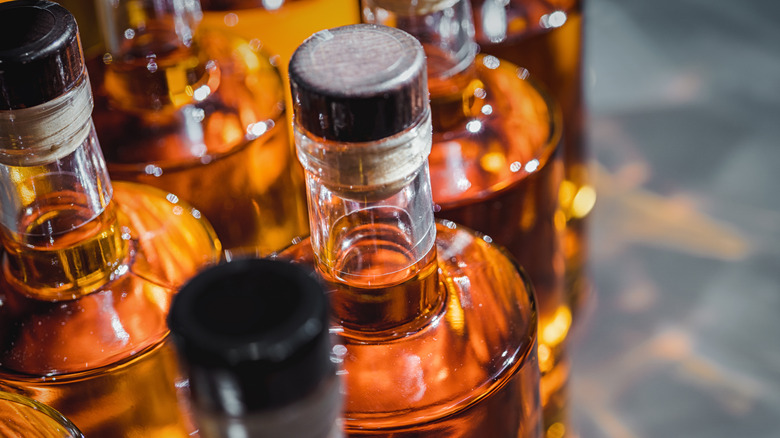When Traveling With Whiskey Bottles, Keep Them Cool And Protected
Part of the appeal of whiskey — as well as other spirits — is its durable nature. There's no need to chill the liquor, consume it all in one go, or worry about a carbonation-induced explosion. An unopened bottle stores endlessly and whiskey will even last for months in a decanter. The spirit will only start to deteriorate once exposed to oxygen, depending on how much liquor is left in the bottle.
Such favorable qualities make it well-suited for travel. Fans can purchase bottles on the road to add to their collection and share with friends. However, to prevent any unwanted accidents, you'll want to take a few precautions before travel. Firstly, ensure protection against glass fractures. Wrap the bottles in thick layers of clothes or other protective materials, binding well to prevent unraveling. Or, even better yet, invest in cardboard tubes explicitly made for liquor and wine packaging.
The other factor worth considering is the sun; whiskey must be kept out of the heat and direct light to avoid flavor loss. Especially when traveling by car, make sure to insulate the bottles and cover them. With such logistics, you'll be able to transport whiskey stress-free.
Carefully package whiskey for transportation, especially avoiding sun exposure
The threat of whiskey bottle fracture is obvious; no one wants an unwanted breakage. However, the dangers of sun-based degradation are easier to miss. It's proposed that damage comes from ultraviolet light, which deconstructs organic compounds in the liquor. These chemicals lose their pleasant flavor, instead contributing off-putting notes to the booze. And, with prolonged exposure, the whiskey may lose its color, too. With the strict rules for adding color to whiskies, it'd be unfortunate to lose that beautiful brown hue.
Additionally, temperature swings worsen the flavor, especially reducing the spirit's aromatic terpene notes. While transporting whiskey, aim to store it in a climate-controlled environment. It's not just heat but also sharp increases from cold to warm that harm. So aim to keep your booze at a comfortable 70 degrees Fahrenheit throughout transit.
The best way to ensure such protection against the elements is to package the bottles securely. Retain those sleeves or nice boxes—manufacturers consider portability before distribution. Especially if you've purchased one of 2023's best whiskeys, it'd be a shame for something to go awry.

